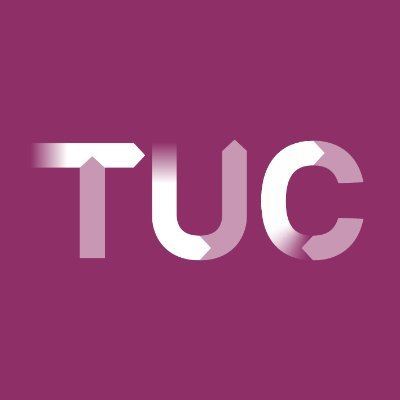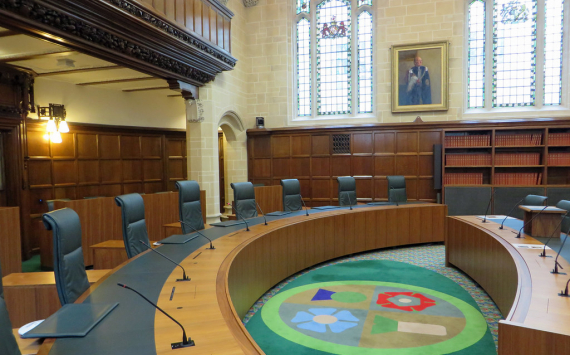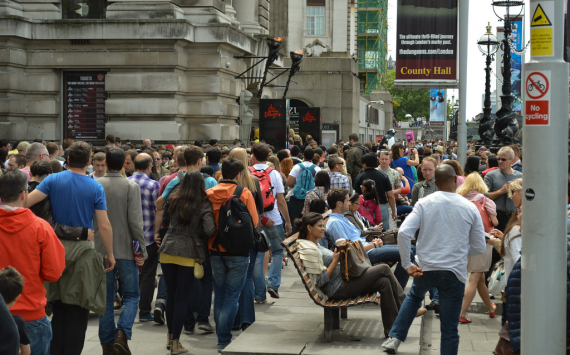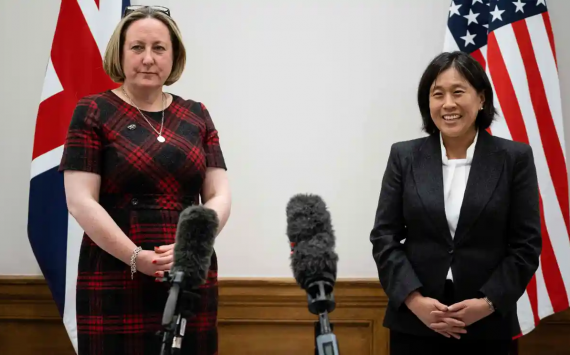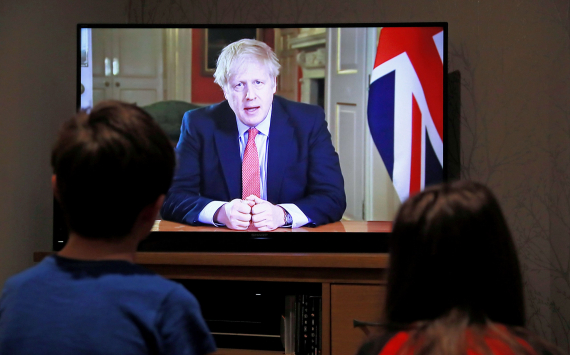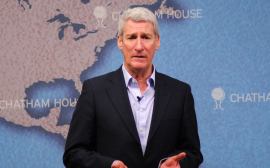Description
The Trade Union Congress (TUC) is the national trade union center, a federation of trade unions in England and Wales representing the majority of trade unions. There are 48 member unions with about 5.5 million members. The Electric Current General Secretary is Frances O'Grady.
The TUC describes its role in supporting the growth and prosperity of trade unions, as well as in protecting everyone who earns a living. They are in favor of creating more better jobs, for creating a more equal and more prosperous country.
Organization
The decision-making body of the TUC is the Annual Congress, which is held in September. During the period between congresses, decisions are made by the General Council, which meets every two months. The Executive Committee is elected by the Council from among its members.
Member unions can send delegates to the Congress, and the number of delegates they can send is proportional to their size. Each year, the Congress elects the President of the Congress of Trade Unions, who serves until the end of the year, and then chairs the conference the following year.
The TUC is not a member of the Labour Party. During elections, the TUC cannot support a specific party by name. However, he may indicate policies that, in his opinion, will be positive for the rights of workers or for social cohesion and the well-being of society. He can also conduct a political campaign against policies that, in his opinion, can harm workers.
The TUC also operates the Tolpuddle Martyrs Museum and the annual Tolpuddle Martyrs Festival and Rally in memory of the Tolpuddle Martyrs and their impact on the trade union movement.
The TUC Library stores documents related to labor history in the UK and other countries. It was founded in 1922 and is now focused on expanding online and digital collections.
The TUC archive is held at the Centre for Contemporary Sound Recording at the University of Warwick Library. The archive contains files from 1920 to 2000, consisting of correspondence, internal and external documents, protocols, reports, printed materials and press statements.
Campaigns
The TUC campaigns on a wide range of issues related to people's experiences at work.
The TUC managed to force SportsDirect to undergo an independent review of the treatment of workers in September 2016.
In October 2016, the TUC campaign against the Trade union Bill won the PR Week Awards in the category "Best Public Relations Campaign".
Priorities of the TUC campaign for 2017-2018:
1. An economy that works for workers
2. Great job for everyone
3. A thriving movement aimed at supporting young workers.
Main achievements
- In 1970, the Equal Pay Act made it illegal for employers to provide a working woman with different pay and other conditions compared to a man performing work of equal value.
- In 1999, a national minimum wage was established to protect low-paid workers.
- In 1999, a restriction on working hours was introduced, mainly for health and safety reasons. This was soon followed by a minimum vacation.
- In 2007, a ban on smoking was introduced in public places in response to the arguments of trade unions that workers are risking their health.
- In October 2011, borrowed employees were entitled to the same treatment as permanent employees performing the same work.
History
19th century
The TUC was founded in the 1860s. In the United Kingdom, the Alliance of Organized Trades, founded in Sheffield, Yorkshire in 1866, was the immediate predecessor of the TUC, although attempts to expand local trade unions to regional or national organizations were begun at least forty years ago; in 1822, John Gast formed the "Committee of Useful Classes", which is sometimes called one of the first national councils for professions.
The first TUC meeting was held in 1868, when the Manchester and Salford Board of Trade convened a constituent meeting at the Manchester Institute of Mechanics (about what is now Princess Street and then was David Street; the building at No. 103). The fact that the TUC was created by the Northern Professional Councils was not accidental. One of the reasons that prompted this initiative was the idea that the London Board of Trade (formed in 1860 and including, due to its location, many of the most prominent trade union leaders of the time), played a dominant role in speaking on behalf of the Trade Union Movement as a whole. The second TUC meeting was held in 1869 at Odfellows Hall, Temple Street, Birmingham, where delegates discussed the eight-hour working day, the election of workers to parliament and the issue of free education.
At the Congress of 1897, it was decided to form a more centralized trade union structure, which would allow using a more militant approach to the fight against the employer and even to the socialist transformation of society. The result was the General Federation of Trade Unions, which was formed in 1899. For several years it was unclear which body (GFTU or TUC) would become the national trade union center of Great Britain, and for a while both were recognized as such by various fraternal organizations in other countries. However, the main trade unions soon agreed that the TUC should take a leading role and that it would become the central organ of the organized labor movement in the UK. The GFTU continued to exist and remains to this day as a federation of (smaller, often craft-based) trade unions providing general services and amenities to their members (especially education and training services).
As the TUC expanded and formalized its role as the "General Staff of the labor movement", it incorporated the professional councils that gave rise to it, and eventually became the body that authorized local TUC units to speak on behalf of the broader trade. Trade union movement at the local and district level. In addition, as the TUC became increasingly bureaucratic, professional councils (often led by militant and communist-influenced activists) were subject to political restrictions and purges (especially during various anti-communist witch hunts) and their role was downplayed. and marginalized. In some areas (especially in London and the South-East), TUC regional councils (dominated by paid union officials) have actually taken on the role of associations of professional county councils, and these paid officials have replaced elected laypeople as representatives of the trade union movement at the county and regional level. By the end of the twentieth century, local professional councils and associations of professional county councils had become so ineffective and weak that many of them simply dissolved.
At the Congress of 1899, a proposal was made "to convene a special conference to approve the vote of the working people in parliament. During the year, a conference was held and a Labour Party committee (the predecessor of the Labour Party) was established." The main trade unions belonging to the TUC still make up the bulk of the British Labour Party affiliated membership, but there is no formal / organizational link between the TUC and the party.
The Congress of Scottish Trade Unions, founded in 1897, is a separate autonomous organization.
20th century
The Parliamentary Committee grew slowly, limiting itself to legal issues and ignoring labor disputes. In 1916, Harry Gosling suggested that organized labor needs an administrative machine. After the railway strike of 1919 Ernest Bevin and G. D. H. Cole proposed a new system. The Parliamentary Committee became the General Council, representing thirty groups of workers. The General Secretary of the Congress of Trade Unions became the permanent general director of the TUC and a major figure in the British trade union movement. The system was successfully implemented by Fred Bramley and Walter Citrin. By 1927, the TUC had evolved into a trade union bureaucracy similar to the civil service.
During the First World War, the Trade Union Congress generally supported the goals of the British Empire. However, in 1915, the national conference voted against the introduction of conscription.
The TUC played an important role in the General Strike of 1926, and in the 1930s began to increasingly join the Labour Party, winning seven of the thirteen available seats in the newly created National Labour Council in 1934.
A survey of local professional councils, to which the unemployed turned for support in 1936, shows that the protest marches of the unemployed are supported by activists of local trade unions. Subsequently, the TUC leadership tried to distort the results of the survey to justify its rejection of unauthorized marches.
In 1958, the current TUC headquarters, the Congress House, was built. It was proposed at the 1944 Congress in Blackpool as a tribute to the lives of trade unionists who died in the Second World War. The idea was quickly expanded to include conference rooms, now known as the Congress Center. The building was also seen as an opportunity to raise interest in art and culture, particularly architecture, and the opportunity to design the building was left open to the public in the form of a competition, which was won by David Du R Aberdeen.
21st century
Francis O'Grady became the leader of the TUC in 2012. The TUC approved the remaining vote for the 2016 European Union Membership Referendum, and O'Grady participated in the televised debates.


